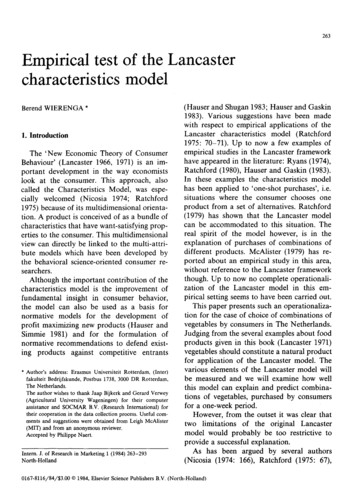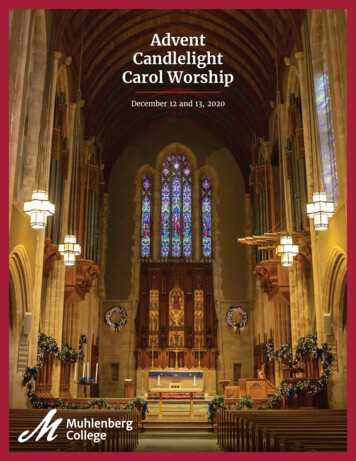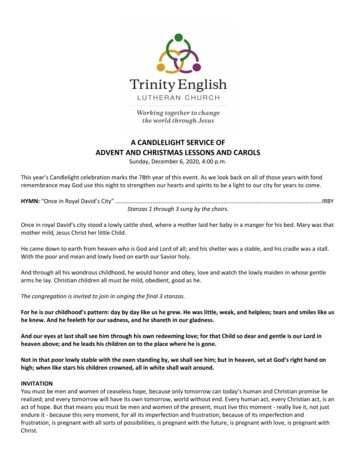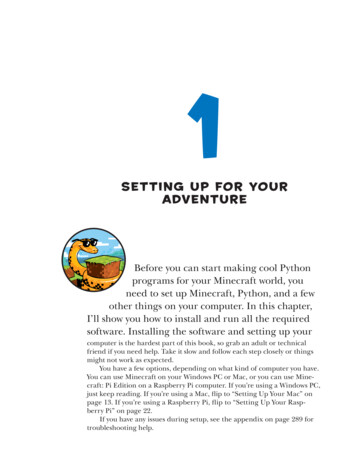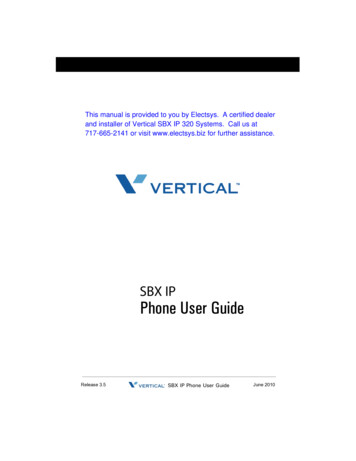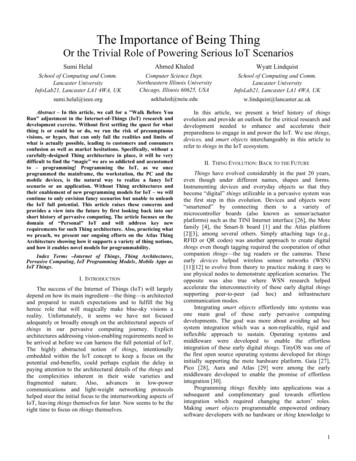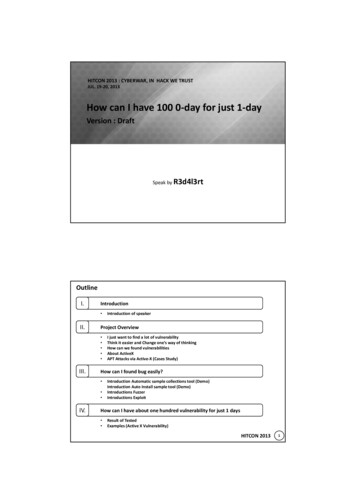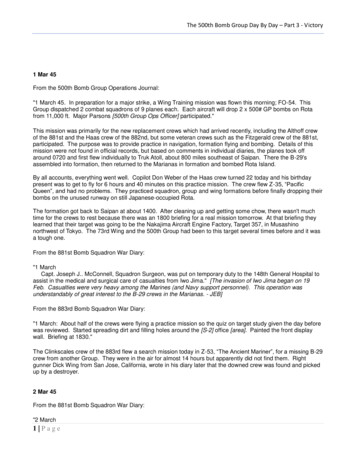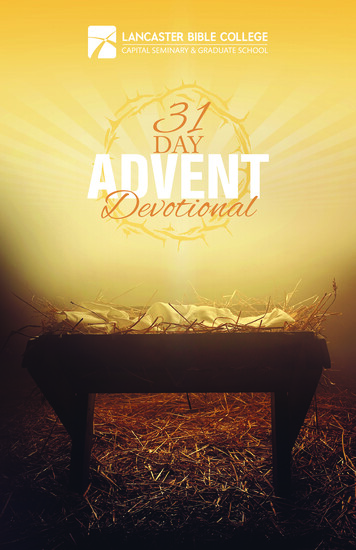
Transcription
31DAYADVENTDevotional
2019, Lancaster Bible College Capital Seminary & Graduate School
31DAYADVENTDevotional— December 2019 —Every Christmas, my family displays our crèche with its exquisiterepresentations of the Virgin Mary, the infant king in His mangerbed, Joseph attending nearby, the shepherds and their sheep, and, at adistance, the wise men who arrive later. Together, we read the Gospel ofLuke, chapter 2, and the account of our Savior’s birth.“A decree went out from Caesar Augustus. Joseph and Mary went upGalilee to Bethlehem to be registered, and while they were there, “ shegave birth to her firstborn son and wrapped him in swaddling clothesand laid him in a manger, because there was no place for them in theinn.” (Luke 2:7)This matter-of-fact account stated in the simplest of terms is truly thegreatest story ever told. The angels appeared and proclaimed, “Forunto you is born this day in the city of David a Savior, who is Christ theLord.” (Luke 2:11) No ordinary baby, this child was Immanuel, Godwith us. (Matthew 1:23) Jesus Christ, fully God, who became man forour salvation.May this collection of Advent devotionals from the faculty of LancasterBible College Capital Seminary & Graduate School enrich yourChristmas celebration, affirming the good news of the gospel, thefoundational truths of the Word of God, and the wonder of theincarnation of Jesus Christ.- Peter W. Teague, EdDPresidentLancaster Bible College Capital Seminary & Graduate School 3
DECEMBER 1It is Always AdventBy Anjanette Bender, JDAssistant Professor, Business Administration DepartmentPsalm 27:14“They’ll be here soon,” my mother would reassure me. I remember as a childwaiting for my parents’ closest friends to arrive for their annual Christmasvisit. These evenings with them were joy filled, and I admit it helped that theyalways came bearing great gifts. The candles were lit, the table was set, thearoma of a much anticipated meal filled our home. My sister and I would peerout the windows, looking for car lights, waiting for long shadows to appear onthe sidewalk. We remembered the laughter and fun of the past and were eagerfor the time we would spend together, just as soon as that doorbell would ring.Oh the waiting, the restlessness, the anticipation.I think it is fair to say that most of us prefer to skip the waiting. Whether it’sfor dinner or houseguests or test results or a child’s heart to change or resolutionto that nagging issue, we would rather not sit in the waiting space. Yet, herewe are, a people called to wait. Interestingly, the Psalmist does not instruct usto wait for good news or solutions or joy. Rather, he charges us to wait uponthe LORD – not an event - but on the LORD Himself. With strength andcourage in our hearts, we are to wait for an encounter with the eye-opening,ever-redeeming, constantly loving God, right there in our restlessness.We are a people called to a posture of waiting, not just during Advent, thisseason of expectancy and preparation, but always. We are to live in the postureof courageously waiting for Christ to be born in the exact moment that weare in, waiting for His presence, His voice, His love and His direction to berevealed, for Him be born anew in our hearts, to change us.We always look for the car lights, eagerly await the doorbell to ring, whileremembering His face, His voice, His faithfulness and eagerly seeking Himright where we are, even when - and especially when - it takes strength andcourage. He will always meet us when we seek Him, while we wait, because itis always Advent.PRAYER: Father, forgive us for our restlessness and impatience in the timesof waiting. We confess these to you while hoping that you will shorten thewaiting time. Thus, our repentance is short lived. Instead, cause us to trulywait on you, on your strength, your lovingkindness, and your perfect plan.Amen.4 31 Day Advent Devotional
DECEMBER 2Courage to InterveneBy Bob Dodson, EdDProfessor, Education DepartmentJoshua 1:9In the centuries before Jesus was born, pagans would celebrate the wintersolstice as a time to honor the coming of the light. During Advent, we celebratethe coming of Jesus, the coming of the Light of the world (John 8:12). Asthe Light, Jesus came to intervene in the darkness to change the course ofhumanity as they knew it. No doubt He did this in love, but Jesus called peopleto courageously follow Him no matter how light or dark the path appeared.This last part seems to scare people. For many of us, it’s hard to talk withpeople in our sphere of influence about the Gospel. We become timid, don’tinitiate or follow through despite knowing Jesus is with us and calls us to becourageous. I’m assuming I’m not the only one to admit that it is hard to be theLight of Jesus to our neighbors, co-workers, friends, and family. ProclaimingJesus takes us out of our comfort zone, but perhaps it shouldn’t. John tells usthat Jesus is the only one who can move us from dark to light (John 1:9-13).With this in mind, can we not simply be His instrument? If we truly allowJesus to live through us and allow His strength to take over, to let us be Hisinstrument, then perhaps, just perhaps, this can take away the fear factor. Thisis a constant decision each of us has to grapple with every day.I am reminded of a quote from Winston Churchill: “Fear is a reaction. Courageis a decision.” To fear is to succumb; to be courageous is to take a stand. If Jesuscame to walk this Earth and intervene through the darkness, then perhaps wecan take a nod from Churchill and choose courage rather than fear; courage tominister to others, serve them, love them to be Jesus to them. And by God’sgrace, He will allow us to be an instrument of change in the course of their lives.He has called for us to courageously intervene through the darkness.It’s wonderful to celebrate Jesus’ coming during the season of Advent.However, I dare us to take celebration to the next level, to follow Jesus’ leadingin courageously intervening by bringing light to the darkness. Who in yoursphere of influence needs to know the Light of the World?Go and intervene in Jesus’ name.PRAYER: Lord, please forgive my fear and hesitancies. Fill me with gratitudefor my salvation that fuels the boldness to share so others will know the Saviorwho came at Christmas. In His precious name, Amen.Lancaster Bible College Capital Seminary & Graduate School 5
DECEMBER 3The Lord Will Take Care of Us,as He Always HasBy Freeman M. Chakara, PsyD, ABPPcnProfessor, Counseling & Social Work DepartmentMicah 5:1–7One would think that the calamity surrounding Israel in the time of Christdemanded a cosmic display of God’s strength and might against His enemies,and yet only a few saw that actually occur. We, as Christians, sometimesexpect that God owes some manifestation of power against those who cause usstress and grief. Surprisingly, His response to Israel was that out of a humblelittle town, shrouded in ignominy and oblivion, will rise the Messiah – theultimate ruler of Israel. The promise in Micah was issued hundreds of yearsbefore ultimate fulfilment, and when Christ was finally born, people did notalways appreciate Him as such. To the few who initially recognized Him, Hereminded them that such a revelation was not brought about by flesh and blood.The little town of Bethlehem gave us a King whose mission was to liberate usfrom the captivity of sin.During this Advent period, it would be quite reassuring to ponder all theseemingly insignificant ways by which the Lord has worked in our lives tobring about His plan. Better yet, we could contemplate the small coincidencesHe may be using in our lives to carry out His will for our families and thosewe encounter. Some of us are surrounded by grieving and troubled coworkersand friends for whom Christmas is a reminder of their distress. Could it be thatsomething as simple as a kind prayer or words of encouragement could be justwhat the Lord uses to bring about His plans in that colleague’s life?May our hearts be sensitive to simple opportunities and events that comeabout for us in this potentially stressful season. From all angles, Bethlehemcould not have been associated with the pomp and circumstance befitting aruler, yet that is precisely where the Lord elected to raise the Savior of his people.The same is true for us. After all, it is simply the humble and nongrandiosethings in our lives that God frequently uses to work out His plans.PRAYER: Gracious Father, our humble lives are simple ones, just as thosewho lived in Bethlehem so long ago. Forgive us when we desire to see thegrandiose rather than the plain. Show us how we can be a simple friend or kindneighbor to those in need during this season. Help me to be your spokespersonexpressing your love and salvation. Amen.6 31 Day Advent Devotional
DECEMBER 4Past, Present and FutureBy Paul Thorlakson, DMAProfessor & Chair, Music, Worship & Performing Arts DepartmentLuke 7:28–35Advent is a time to reflect backward as well as forward. We often focus on theprophecies, people and events that set the stage for the main event; when Christbroke through the heavens to bring redemption to this weary world. In Luke7:28-35, Jesus is referring to the prophet, John the Baptist, and his divinelyappointed role in preparing the way for His earthly ministry.Throughout my life, I have become keenly aware of the way God hasplaced people in my path who have helped to prepare me. About a decadeago, a persistent dark cloud seemed to intrude into every area of my world. Itwas debilitating. One Saturday morning, the oppressiveness of that cloud wasespecially intense and troubling. At about 10 a.m. in a remarkably miraculouslyinstantaneous way, that cloud seemed to pass, and the sun began to peekthrough. Two days later, I received an email from a friend, who I had not beenin contact with for a long time. He wrote that God had laid it on his heartto pray for me on that same Saturday morning. I was absolutely stunned andgrateful for my friend’s spiritual sensitivity.As a person who has been called to ministry and academic leadership, I amaware that I build on the legacy of other leaders who have preceded me. Thatinspires humility and gratitude, fully realizing that there are times when Ihave been able to reap what others have labored to sow. Furthermore, thereis reassurance that the heavy slogging of my work, when results seem slow atcoming, God could be using me to prepare the way for others. At the end ofthe day, God demands one thing faithfulness, the ultimate legacy of Christcentered leadership.As I reflect on these two illustrations from my life, I am reminded of the needto recognize that we live and work within a continuum of the past, present, andfuture. We can be thankful for all those who have prepared the way for us andhopeful in the knowledge that we play a part in laying the groundwork forothers. We will be able to do that if our hearts are open and sensitive like thosewho heard John’s call to repentance and were ready to follow Christ.PRAYER: Gracious Father, thank you for those who have gone on before me,prepared the way for me, and laid the path for my steps. Cause my own steps tobe carefully laid for those who come behind me. Amen.Lancaster Bible College Capital Seminary & Graduate School 7
DECEMBER 5Lament in AdventBy Diane Dick, PhDProfessor, Education DepartmentPsalm 88ADVENT! CHRISTMAS! Most people look forward with great anticipation tothis blessed season of celebration, but for some it is a very difficult season. Perhapsyou or someone you know has had an alarming diagnosis, or has lost a familymember, or has experienced a broken relationship, or has lost all joy in living.I remember years ago when my husband and I received a daunting diagnosison our only son–autism and seizure disorder. It was in November, and I had nodesire to celebrate Advent or Christmas. I did not really want to hear the storyof Jesus being born, or the shepherds abiding, or the wise men coming from theeast. We were grieving our child’s condition, and any thought of celebration orfuture celebrations was out of the question. I was in a stage of lament.We do not, as believers, talk or use the word – lament, but in Psalm 88, thepsalmist writes a song about suffering and affliction. In fact, this Psalm seemsto be the darkest and saddest chapter of the entire book. How do we celebratewhen we feel like this? After all, if God is not going to listen to me, then whyshould I celebrate His Son’s coming to earth in the form of a baby?Here is the point where I had to stop and realize that just because Godis silent from time to time does not mean He does not love me, hear me, oranswer my pleas for help (Psalm 88:1, 2). He sent His Son to die for us and tosave us – that is the real meaning of Advent and Christmas, and He does notmind our laments.After much lamenting to God, He answered our prayers for our son. No,he was not healed, but through this difficult process, we have been taught somuch about our Heavenly Father. Now when we read Advent passages, our sonrecognizes the story of Jesus’s birth, and I am confident that he knows the joy ofChristmas. So, we can once again approach Advent and Christmas with greatenthusiasm and confidence about the birth of our Savior and the knowledgethat one day we will spend eternity, healed and whole, praising our Lord JesusChrist.PRAYER: Gracious Father, your awareness of our lamenting is a comfortwhen we are in the midst of that season. Thank you for your compassion,understanding and peace for that season, and the strength to take up the nextday. Keep us remembering your sovereignty while we lament. Amen.8 31 Day Advent Devotional
DECEMBER 6Comfort YeBy Rachel Sidebothom, MMEAssistant Professor &Associate Chair,Music, Worship & Performing Arts DepartmentIsaiah 40As a musician, specifically as an oboist, I am often called upon to play forGeorge Fredrich Handel’s “Messiah” during the Christmas season. Thisoratorio, composed by Handel in 1741 (setting the libretto by Charles Jennens),is one of the few works in our canon of Western music that speaks truthdirectly from Scripture and tells of the complete work of Christ! The first partcenters on Old Testament prophecies of the coming of the Savior and presentsChrist’s birth, while the second and third parts portray the passion, death, andresurrection of our Savior, and the coming judgment day of Christ, giving hopeto those who are found in Him. The text for “Messiah” is straight from God’sWord. You might be most familiar with “Hallelujah” or “Worthy is the Lamb,”two of the glorious pieces in this oratorio, which lead us in profound and joyfulworship of our Lord and Savior, Jesus Christ.But one of my favorite moments of the “Messiah” is in contrast to thosepowerful, stirring pieces and arrives soon after we play the “Sinfony” oroverture. The first words sung in this masterful work are “Comfort Ye.” Haveyou ever considered the power in this simple truth that sets up the rest of theGospel presented in this work? Isaiah 40:1–3, “Comfort ye, comfort ye mypeople, saith your God. Speak, ye comfortably to Jerusalem, and cry unto her,that her warfare is accomplished, that her iniquity is pardoned .”What a hope-giving and joy-filled peace these truths give us! Our war withsin has already been won! Our iniquity is pardoned! And, as Isaiah continuesin chapter 40 and Handel presents in the “Messiah,” the glory of our God willbe revealed! I find my soul resting and settling as I listen to those resoundingtruths sung by a powerful voice each time I perform Handel’s Messiah. God isspeaking comfort and hope to each of us in this Advent season. In the hustleand bustle, rest in His finished work on our behalf.PRAYER: Father in Heaven, thank you for the promise of your comfort inthe promise of Jesus as our Messiah. His coming then and the promise of Hisreturn comfort my heart. Help me to rest in that when the days of stress orturmoil bring havoc to my soul. Amen.Lancaster Bible College Capital Seminary & Graduate School 9
DECEMBER 7Small and SecretBy Shanika Churchville, MEdWriting Services Coordinator, Ally Center2 Corinthians 4:16I spend much of my days with students in the process of writing. They oftenfind it slow, tedious, not immediately gratifying. They want to produce pagesand papers and often have to settle for word by word. I try to offer words ofcomfort: “Writing is a spiritual discipline. When you write, you not only engagein a humbling discipline of details, you imitate the slow, secret, consistent workGod does every day.” They aren’t always convinced.Being immersed in writing has given me a great context in which to ponderthe slow, incremental way in which God often works. He did not send his Sonto us fully grown, in a blaze of glory. Rather, he planted the salvation of theworld in Mary’s womb to develop cell by cell. Our Messiah grew inch by inch.Picture him over the years – he grew taller, his voice deepened, he outgrew hissandals. God committed Himself to the unhurried and unglamorous process ofdeveloping the Light of the world from embryo to fully man.The Bible is full of analogies comparing the spiritual life to the slow, hidden,and laborious. Consider its many plant metaphors: the seed dies in the secrecyof the soil to raise new life (John 12:24); the tree reaches its long roots deep tomeet water (Psalm 1:3); the tiny, unassuming mustard seed eventually burstsinto a large and glorious tree (Mark 4:30–32).At this time of year, on the cusp of the old, leaning into the new, we oftenyearn for sudden and dramatic transformation – pounds lost, miles run, unrulychildren miraculously transformed. Of course, we serve a God of miracles, aGod who transforms. Yet, so much of what God does is hidden, tiny, dailyand in secret. The God of the universe is also, to borrow the words of novelistArundhati Roy, the “God of small things.” As we celebrate God’s faithfulnessin the big things, let us also praise Him for the slow and daily renewal Heworks in our hearts, in secret, with great grace and love.PRAYER: Oh, Heavenly Father, your wisdom in sending your Son to grow anddevelop is overwhelming. Forgive us for wanting results to occur quickly andwithout a process. Show me the small steps to walk slowly as I grow in my lifewith you. Help me to find your steps to be the best ones for me. Amen.10 31 Day Advent Devotional
DECEMBER 8When You Walk Through the WatersBy Vickie Byler EdDProfessor, Health & Physical Education DepartmentIsaiah 43:2The shepherds who heard the angels announcing Christ’s birth had remarkableresponsibilities. Caring for their sheep serves a reminder of a familiar passagein Isaiah. In researching the role of the shepherd with his sheep, we can seethese parallels.First, sheep are born followers. Even if harm is ahead, sheep will blindlyfollow to their death. If sheep fall on their backs, this could be fatal. Bloodcannot flow to their legs, and if a shepherd does not act quickly, the sheep willdie. Sheep cannot swim due to the wool coat that absorbs water, and as a resultare instinctively afraid of water. The shepherd is aware of this and seeks to findquiet waters for the sheep to drink. When a shepherd must have sheep crossthe water, he goes ahead of them. The sheep closest to him jump right in andcross with ease. Those further back are more hesitant but follow in the path ofothers. Those in the back must be pushed into the water by the dogs who arehelping. Some are carried down the river with the waters, but the shepherd iswatching from the other side and steps in to rescue them.As Isaiah 43:2 states “When you pass through the waters, I will be with you;and when you pass through the rivers, they will not sweep over you .” Whenthe trials of life or the raging storms come, if we stay close to the shepherd andtrust in His leading, we can jump right in the water and cross safely. Sometimeswe are in the middle of the her
Lord.” (Luke 2:11) No ordinary baby, this child was Immanuel, God with us. (Matthew 1:23) Jesus Christ, fully God, who became man for our salvation. May this collection of Advent devotionals from the faculty of Lancaster Bible College Capital Seminary & Graduate School enrich your Christmas celebration, affirming the good news of the gospel .

